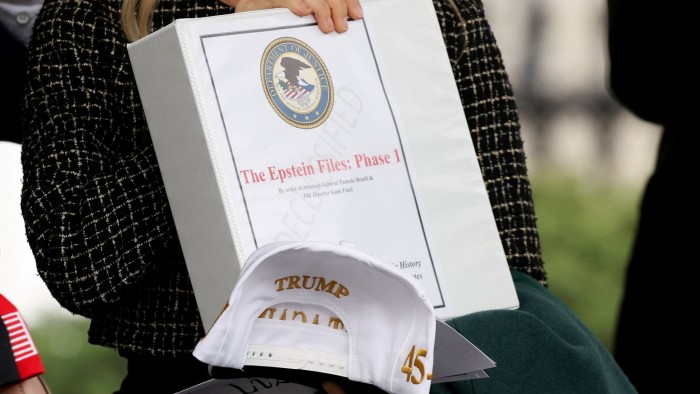Unlock the White House Watch newsletter for free
Your guide to what Trump’s second term means for Washington, business and the world
When Donald Trump bombed Iran last month, the likes of Tucker Carlson and Steve Bannon revolted. A president who had criticised America’s previous (mis)adventures in the Middle East was risking another, like a third President Bush and not the America First-er of their dreams.
Another crack in the movement has opened up over the matter of Jeffrey Epstein. Some in Maga world believe the sex offender, who died by suicide in 2019, had dirt on high-profile individuals, who duly had him murdered. Having fanned these theories for years, Trump has released a memo that contradicts them. He now wants people to move on. Because his followers are sure that an arrogant and self-dealing elite floats above the law (can you think of any examples?) they won’t oblige.
It is not even clear that either of these splits between Trump and his flock will be the biggest of the summer. The president appears to be warming to Ukraine and Nato. He is newly critical of Vladimir Putin. The many Kremlin-admirers on the US right must wonder what happened to the man who ambushed Volodymyr Zelenskyy in the Oval Office a few months ago.
All these tiffs will pass. But each one exposes an important truth: Trump and Maga are no longer the same thing. His movement — the intellectuals, the donors, the more online of the grassroots — have intense beliefs. Besides a life-long conviction that running a current account deficit with another nation constitutes “losing”, he doesn’t.
None of this is fatal to Trump himself. He papers over the differences with force of charisma, electoral success and the dutiful enactment of key Maga priorities. (Such as vaccine scepticism and the kind of public health quackery that he plainly doesn’t believe in.) This will protect him from serious internal dissent until 2029, when he is scheduled to leave office, or at least until the midterm elections in late 2026. Carlson and Bannon don’t speak for lawmakers, administration officials or other centres of Republican power.
Still, we can now see what the future of the US right looks like. Unless the Republicans find another version of Trump — someone whose star power overwhelms all philosophical reservations about him or her — the next leader will have to be more in tune with the movement. That is, more Christianist, more nationalist, more paranoid. An extreme rightwinger can put up with half a loaf under Trump because he provides so much else in dazzle and tribal leadership. You aren’t getting that with JD Vance. Ideological and even personal litmus tests, which have been waived for Trump, could return.
In other words, we have to entertain the notion that Trump is a moderating influence on a movement that will become much more doctrinal once he is gone. He approaches the world through personal relations, which are malleable, not ideas, which aren’t.
Consider Ukraine policy. In all likelihood, Trump has been soft on Putin because he appreciates the Russian’s well-aimed flattery and resents the cost to the US of protecting Europe from him. This is bad, but it isn’t dogmatic. Much of Maga, in contrast, backs Putin out of a belief that Russia is nothing less than Christendom’s frontline, whether against Islam or secular Chinese communism or the woke enemy within. Because it is practical, Trump’s position can be shaken, as seems to be happening now. (This remains true even if you think the reason for his behaviour is that Russia has kompromat on him.) It isn’t clear what could ever sway a President Vance or Carlson towards Ukraine.
There are worse things than a personality cult, such as an ideas cult. For a decade, conservatism has been whatever Trump says it is. He has made it possible to regard China as the threat of the century but admire Viktor Orbán, who is China’s biggest friend in Europe; to oppose vaccines but not the president who oversaw the Covid vaccine; to view Ukraine as another region’s problem but Iran as a core US interest. This is an intellectual farrago, but it might be preferable to hard, consistent doctrine.
It was always an odd fit: the libertine and the scolds of ultraconservatism. Trump doesn’t share the movement’s interest in the fate of “western civilisation” and other grandiose abstractions. He is not much of a China hawk: his concern is the bilateral trade data, not the grand strategy, much less the contest of values. As for religion, we can’t know another person’s inner life, but come on.
Here is a prediction. In the 2030s, the conservative movement will view Trump as a disappointment and sellout, as it regards George W Bush as soft on China, and Ronald Reagan as credulous about the advantages of free trade. Candidates will be pressed to say how they will undo Trump legacies that were Republican In Name Only.
There is but one consolation for aghast liberals reading this. A GOP that is less Trump and more Maga is likely to be less successful with voters. Trump has what we might call ick immunity. He can take alt-right positions without coming across as weird and low status, at least to a plurality of voters. He also knows when to curb the movement. Once the federal right to abortion was struck down, he didn’t go after same-sex marriage. A future in which Trump is looked back on as a relative pragmatist: it is hard to know whether liberals should dread it, or will it on.



